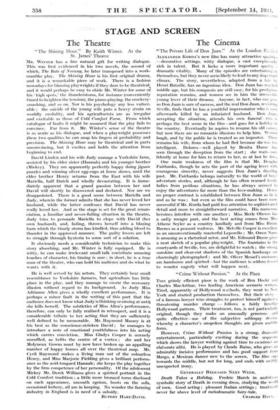The Cinema
"The Private Life of Don Juan." At the London Paeiiic ALEXANDER KORDA'S new film has many attractive qualities —decorative settings, witty dialogue, a cast exceptionally rich in talent. But it lacks a more important quality— dramatic vitality. Many of the episodes are entertaining in themselves, but they never seem likely to lead to any important climax. The story, nevertheless, adapted from a tale 1w Henri Bataille, has an ingenious idea. Don Juan has reached middle age, but his conquests are still easy, for his prodigious reputation remains, and women see in him the irresistible young lover of their dreams. Anyone, in fact, who can post. as Don Juan is sure of success, and the real Don Juan, revisiting Seville, finds that he has a youthful impersonator who is soon afterwards killed by an infuriated husband. Don Juan. accepting the situation, attends his own funeral—this is perhaps the best scene in the film—and goes for a holiday in the country. Eventually he aspires to resume his old career. but now there are no romantic illusions to help him. Women laugh, and by the public he is treated as an impostor. There remains his wife, from whom he had fled because she was too intelligent. Dolores—well played by Benita Hume has seen through the deception from the start ; she waits con- fidently at home for him to return to her, as at last he does.
One main weakness of the film is that Mr. Douglas Fairbanks, though he acts the part of the ageing lover with courageous sincerity, never suggests Don Juan's dazzling past. Mr. Fairbanks belongs naturally to the world of bays' adventure stories, and, although he has often rescued lovely ladies from perilous situations, he has always seemed to enjoy the adventures far more than the love-making. Hence no proper contrast is established between Don Juan as he is and as he was ; but even so the film could have been more successful if Mr. Korda had paid less attention to sophisticated detail and more to straightforward narrative. His numerous heroines interfere with one another ; Miss Merle Oberon has a sadly meagre part, and the best acting conies from Miss Athene Seyler as a country landlady and from' Miss Bionic Barnes as a peasant waitress. Mr. Melville Cooper is excellent as an unconventionally masterful Leporello ; Mr. Owen Nares is amusing as a rhetorical actor, and Mr. Edmund Breon gives a neat sketch of a popular playwright. The fountains in the courtyards of Seville, too, are delightful to watch ; the strong sunshine and clear-cut shadows of the Spanish lancUcape are charmingly photographed ; and Mr. Oliver Messel's costumes are handsome and spirited—but the audience is seldom forced to wonder eagerly what will happen next.










































 Previous page
Previous page